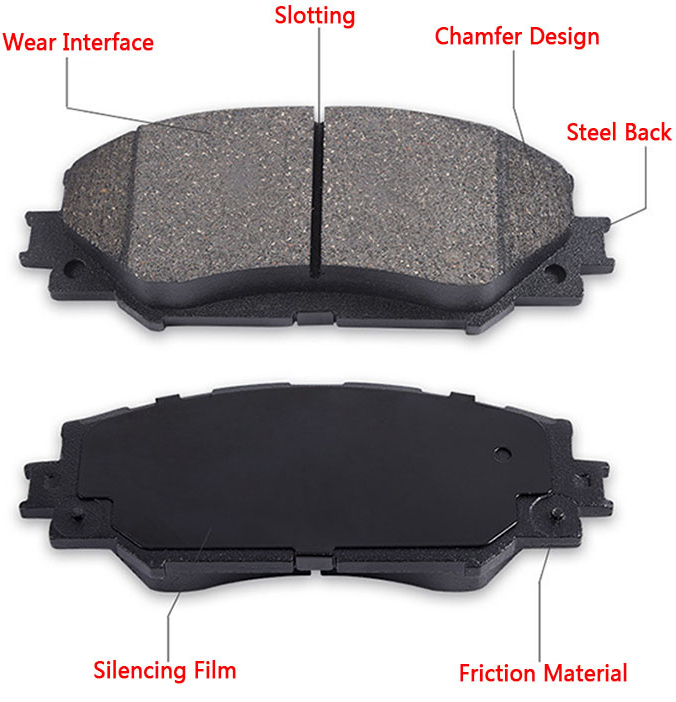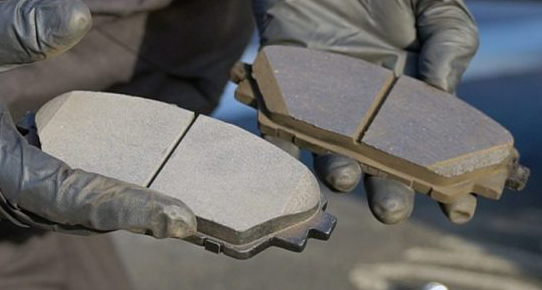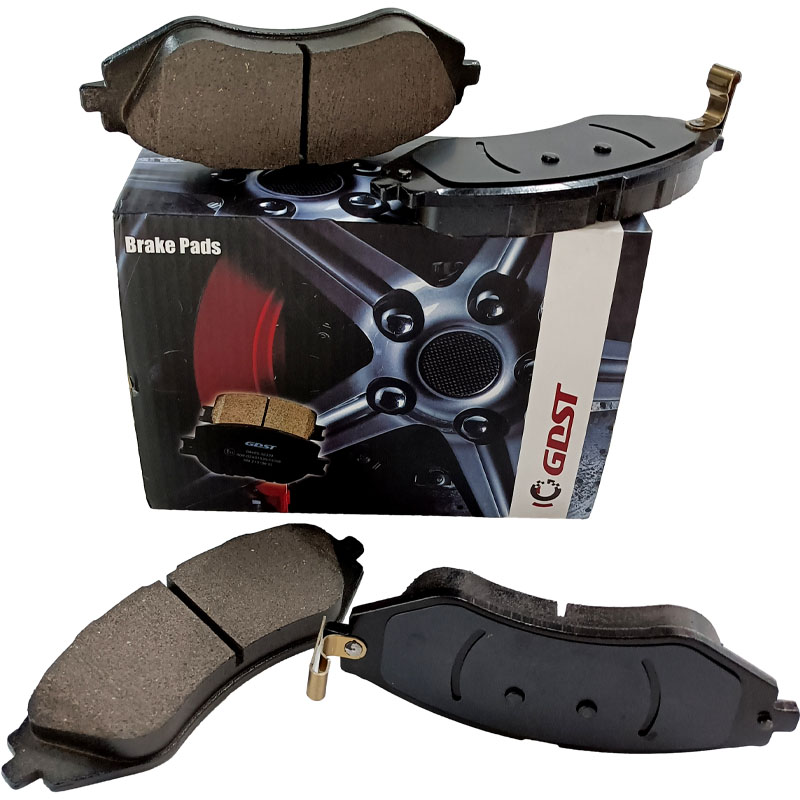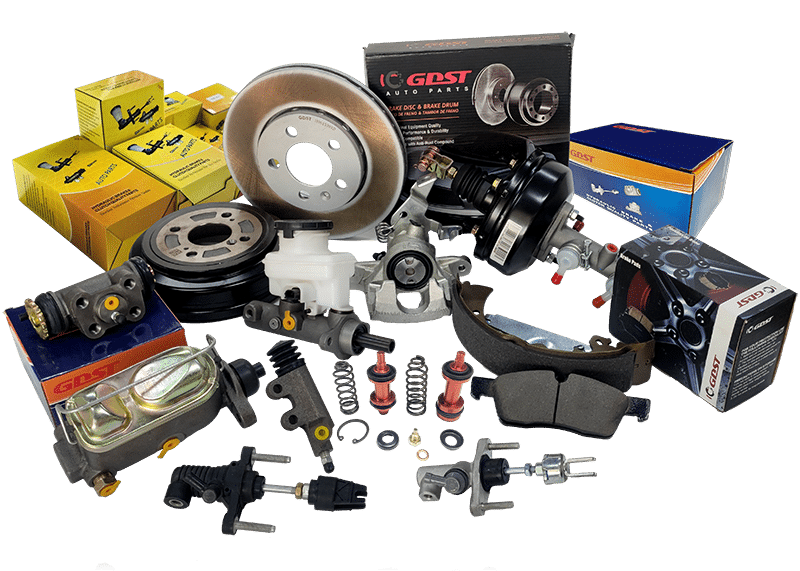What are brake pads made of?

Brake pads are made from a combination of materials that are designed to provide friction and convert the kinetic energy of a moving vehicle into thermal energy, thus slowing down or stopping the vehicle. The specific composition of brake pads is different depending on the type of brake pad and manufacturer, but common materials used in brake pad construction include:
- Friction materials: Brake pads typically have a friction material that comes into direct contact with the brake rotor to create the necessary friction for braking. These friction materials are usually made of a combination of organic, semi-metallic, ceramic, or low-metallic materials. Organic brake pads may use materials such as rubber, glass, and resin. Semi-metallic brake pads may contain metal fibers such as steel, copper, and/or brass mixed with other materials. Ceramic brake pads often use ceramic materials combined with other fibers.
- Binders: Binders are used to hold the friction materials together and help them adhere to the brake pad backing plate. Common binders used in brake pads include phenolic resins, synthetic resins, and other adhesive materials.
- Backing plate: The backing plate of a brake pad provides structural support and helps to dissipate heat generated during braking. It is typically made of steel or other suitable materials that can withstand high temperatures and mechanical stress.
- Shims: Brake pads may also include shims, which are thin metal or rubber plates that can help reduce noise and vibration by dampening brake pad vibrations and preventing brake squeal.
- Wear indicators: Some brake pads may also include wear indicators, which are small metal tabs or sensors that create noise when the brake pads wear down to a certain level, indicating that it’s time to replace the brake pads.
The specific materials used in brake pad construction depend on factors such as performance requirements, noise reduction, heat dissipation, and environmental considerations.
Why is my car brake making noise?

Sometimes, new brake pads need to be broken in. Brake noise can be caused by various factors, and it is best to consult a qualified mechanic or automotive technician for a proper diagnosis and repair. Here are some common reasons why your car brakes may be making noise:
- Worn brake pads: when Brake pads wear down over time and need replacement, they will make a squeaking, squealing, or grinding noise. Brake pads are designed to alert you through the noise that it is time to replace them when they are nearing the end of their life.
- Brake rotor issues: Brake rotors can become warped or uneven due to heat, friction, or wear, which can result in noise when the brakes are applied. Warped or uneven brake rotors can cause vibrations, squeaking, or scraping noises.
- Caliper problems: Brake calipers are responsible for applying pressure to the brake pads to stop the vehicle. If the calipers are sticking or not functioning properly, they can cause uneven wear on the brake pads, resulting in noise.
- Brake dust or debris: Dust, dirt, and debris can accumulate on the brake pads or rotors, causing noise when the brakes are applied. This can often be resolved by cleaning the brake components.
- Loose or worn hardware: Brake hardware, such as clips, shims, and springs, can become loose or worn over time, resulting in noise when the brakes are applied.
- Moisture or rust: If your car has been exposed to moisture or has been sitting idle for an extended period, the brake rotors can develop surface rust, which can cause noise when the brakes are applied. This can often be resolved by driving the vehicle and applying the brakes to remove the rust buildup.
- Improper installation: If the brakes were not installed correctly during a recent repair or replacement, it can result in noise. This may include improper installation of brake pads, rotors, calipers, or other brake components.
It’s important to note that driving with noisy brakes could indicate a safety issue and may potentially compromise your vehicle’s braking performance. Therefore, if you are experiencing unusual brake noises, it’s best to have your car inspected by a qualified mechanic or automotive technician to determine the root cause and take appropriate action for repair or replacement.
What kills brake pads?

Several factors can contribute to the wear and tear of brake pads, eventually causing them to “die” or become ineffective. Here are some common factors that can lead to brake pad wear:
- Friction and heat: Brake pads are designed to create friction against the brake rotors, which generates heat and slows down the vehicle. Over time, the constant heat and friction can wear down the brake pad material, causing them to become thin and less effective.
- Driving habits: Aggressive driving, such as frequent hard braking or riding the brakes, can accelerate brake pad wear. Abrupt stops from high speeds or applying the brakes forcefully can generate more heat and wear down the brake pads faster.
- Environmental factors: Driving in extreme conditions, such as driving in hilly areas, towing heavy loads, or driving in stop-and-go traffic, can put additional strain on the brake pads and cause them to wear out faster.
- Quality of brake pads: The quality of the brake pads themselves can also affect their lifespan. Low-quality or budget brake pads may wear out more quickly compared to higher-quality, OEM (Original Equipment Manufacturer), or performance-grade brake pads.
- Lack of maintenance: Neglecting regular brake maintenance, such as not cleaning or lubricating brake components, can result in accelerated brake pad wear. Additionally, ignoring warning signs of worn brake pads, such as squeaking or grinding noises, and failing to replace them promptly can result in increased wear on the remaining brake pad material.
- Contaminants: Brake pads can also be affected by contaminants, such as dirt, debris, or moisture, which can accumulate on the brake pad surface and accelerate wear.
- Corrosion or rust: Brake pads can wear out faster if the brake rotors develop corrosion or rust, which can create uneven surfaces and result in increased friction and wear on the brake pads.
It’s important to note that brake pads are a crucial safety component of your vehicle’s braking system, and worn brake pads can compromise your vehicle’s braking performance, leading to reduced stopping power and increased risk of accidents. Regular brake maintenance, including inspection and replacement of worn brake pads as needed, is essential for safe and reliable vehicle operation.
Do cheap brakes make noise?

The price of brake pads alone does not necessarily determine whether they will make noise or not. Brake noise can be influenced by various factors, including the quality and composition of the brake pad material, as well as how the brake pads are installed and used.
While it is possible that some inexpensive or budget brake pads may produce noise, it’s not solely due to their price. Brake noise can occur with brake pads of any price range, including higher-end or premium brake pads. Noise can be influenced by factors such as the specific brake pad material, the design of the brake system, the condition of other brake components, the type of driving conditions the vehicle is subjected to, and the maintenance and installation practices followed.
Inexpensive brake pads may use different materials or have different manufacturing processes compared to more premium brake pads. These differences can affect their performance and noise characteristics. For example, some cheaper brake pad materials may be more prone to generating noise due to increased friction or vibration, while higher-quality brake pads may be designed to reduce noise through advanced materials, shims, or other noise-reducing features.
To minimize the chances of brake noise, regardless of the price range of the brake pads, it’s important to follow good maintenance practices, including proper installation, cleaning, and lubrication of brake components, and using brake pads that are recommended for your specific vehicle make and model. If you’re experiencing brake noise, it’s best to consult a qualified mechanic or automotive technician for a proper diagnosis and appropriate action.
What type of brake pad is best?

The best type of brake pad for your vehicle depends on various factors, here are some common types of brake pads and their characteristics:
- Organic/Non-metallic brake pads: These brake pads are made of organic materials such as rubber, glass, and resin, mixed with filler materials. They tend to be affordable and provide a good initial bite with low noise levels. They also tend to be softer and produce less wear on the brake rotors, which can be beneficial for rotor longevity. However, organic brake pads may not be as effective at high temperatures and may wear out more quickly, especially in performance or heavy-duty applications.
- Semi-metallic brake pads: These brake pads are made of a mixture of metal fibers, such as steel, copper, and/or brass, combined with organic materials. They provide better heat dissipation compared to organic brake pads and are generally more durable, making them suitable for a wider range of driving conditions. Semi-metallic brake pads offer good stopping power, but they can produce more noise, generate more dust, and wear down the brake rotors faster compared to organic brake pads.
- Ceramic brake pads: These brake pads are made of ceramic materials mixed with organic or metal fibers. They are known for providing quiet operation, producing less dust, and offering good stopping power. Ceramic brake pads are also typically more expensive compared to organic and semi-metallic brake pads, but they tend to offer a longer lifespan, lower noise levels, and less wear on the brake rotors.
- Low-metallic brake pads: These brake pads are similar to semi-metallic brake pads but contain a lower percentage of metal content. They offer good stopping power, heat dissipation, and durability, while generally producing less noise and dust compared to semi-metallic brake pads. Low-metallic brake pads can be a good compromise between organic and semi-metallic brake pads in terms of performance and characteristics.
The best type of brake pad for your vehicle depends on your specific needs and preferences. For daily driving, organic or low-metallic brake pads may be suitable for most vehicles. If you do a lot of performance driving or towing, semi-metallic or ceramic brake pads may be a better choice due to their higher heat dissipation and durability.





